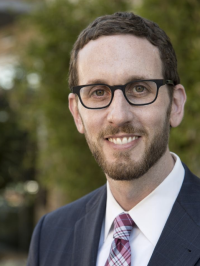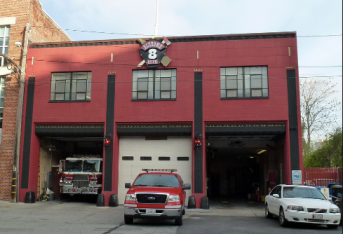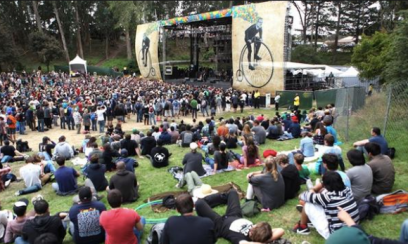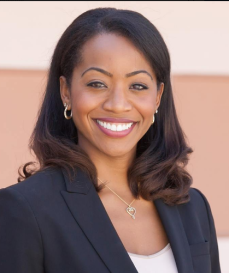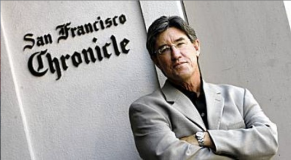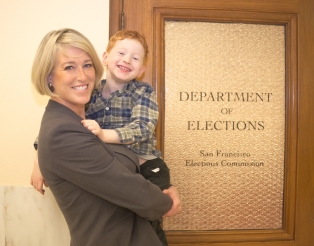Other than the Presidential Primary, this ballot is a snoozer. The six ballot measures are mostly uncontroversial, and our congressional and state delegates are largely unopposed. The rest are down-ballot races that very few of you care about… but I do! And that’s why you are here. I’m happy to help you cut through the crap and decide who you will vote for on Tuesday.
Before we begin, I should clarify that the opinions I express in this voter guide are my own, and should not be attributed to my employer, my baby girl, or any of the many Democratic clubs I belong to. Please send all hate mail to me at info (at) votealix.com.
In the interest of full disclosure, I’m a single mom, a liberal Democrat attorney and a government nerd, whose passions include arts and culture, getting more women elected to public office, and protecting our environment for future generations. I’ve worked on more political campaigns than I can count, including my own, and I also like long walks on the beach.
Here’s the summary, with detailed explanations below:
President of the United States – Elizabeth Warren
*Though, to be clear, I will vote for any Democrat in November
US Congress, D12 – Nancy Pelosi
US Congress, D14 – Jackie Speier
State Senator, D11 – Scott Wiener
State Assembly D17 – David Chiu
State Assembly D19 – Phil Ting
Superior Court Judge, Seat #1 – Maria Evangelista
Superior Court Judge, Seat #18 – Dorothy Chou Proudfoot
Superior Court Judge, Seat #21 – Kulvindar “Rani” Singh
Democratic County Central Committee – AD17 (Central/East side of SF)
Kristen Asato-Webb
Nima Rahimi
Mike Chen
Frances Hsieh
Austin Hunter
Tyra Fennell
Victor Olivieri
Mick Del Rosario
Bivett Brackett
Tami Bryant
Vallie Brown
Steven Buss
Democratic County Central Committee – AD19 (West side)
Abra Castle
Kathleen Anderson
Nadia Rahman
Cyn Wang
Suzy Loftus
Jane Natoli
Seeyew Mo
Mary Jung
Mawuli Tugbenyoh
CA Proposition 13 – YES
SF Proposition A – YES
SF Proposition B – YES
SF Proposition C – YES
SF Proposition D – YES
SF Proposition E – NO
President of the United States – Elizabeth Warren
Wow, they are dropping like flies, aren’t they? On the eve of Super Tuesday, Steyer and Buttigieg just dropped out of the race. That leaves Sanders, Biden, Warren, Klobuchar and Bloomberg. If you are starting to think that Bernie has this thing wrapped up, I refer you to the numbers below, showing that this thing is still anyone’s race.

I am supporting Elizabeth Warren because she is the only candidate who gives me hope for America. She understands the struggles of working families, having lived it and breathed it herself, and she has translated that understanding into workable policies that will actually improve people’s lives. She’s thoughtful, fearless and above all, persistent. And her comedic timing is unmatched.
“Comedic timing?” You ask. “Why on earth would that matter for a presidential candidate?!” Ask Hillary Clinton that question, and then ask Donald Trump. The candidate with the quickest wit is the one best suited to beat Trump at his own game: on the debate stage and on social media. And that is, to me, what matters more than anything.
I also want to remind you that a candidate only gets a state’s delegates to the national convention if they receive 15% of votes statewide. A candidate can also get delegates in individual congressional districts if they get 15% in that district. I know, it makes my head hurt too. Klobuchar is polling at less than 10%, so if she is your first choice, I suggest voting for someone else to make sure your vote counts. Or, you know, you could vote your conscience. Nothing wrong with that.
But regardless of who you vote for in the primary, I hope you will join me in voting for WHOEVER THE FUCK THE DEMOCRATS NOMINATE AGAINST TRUMP. Seriously. Call voters, knock on doors, donate money, do everything you can to get the Trump criminal enterprise out of the White House.
US Congress, D12 , Nancy Pelosi
 Madame Speaker is the most powerful woman in American government, and she has wielded that power in favor of progressive values in an extremely challenging political environment. She is partly responsible for wresting the House back to Democratic control in 2018 by supporting the right candidates (including many women!) in swing districts. I also admire her ability to troll President Trump and get under his skin. I am voting for her with enthusiasm.
Madame Speaker is the most powerful woman in American government, and she has wielded that power in favor of progressive values in an extremely challenging political environment. She is partly responsible for wresting the House back to Democratic control in 2018 by supporting the right candidates (including many women!) in swing districts. I also admire her ability to troll President Trump and get under his skin. I am voting for her with enthusiasm.
Several folks are running against her this year, including attorney Shahid Buttar, who ran two years ago claiming that Pelosi isn’t progressive enough for San Francisco. I disagree, and I also think that this is not the year to throw Speaker Pelosi – a woman, a fighter, and President Trump’s political nemesis – out of office. It would be the absolute wrong message to send to the rest of the country.
US Congress, D14, Jackie Speier
Incumbent Jackie Speier has no credible opposition.
State Senator, D11, Scott Weiner
 Over the years I have worked with Senator Scott Wiener in advocating for nightlife and culture and paid parental leave. He is also known for his work in improving public transit and access to housing. He is a tireless and prolific legislator, and in recent years he has been relentless in advocating for the development of housing of all kinds across the state. Because he has been fearless in tackling some of the states’ most intractable issues, he’s also made some enemies – especially among those who oppose real estate development. Personally, I agree with Scott that cities of all sizes need to start making sacrifices to build denser housing and taller buildings – it’s the only way out of our perpetual housing crunch in this state.
Over the years I have worked with Senator Scott Wiener in advocating for nightlife and culture and paid parental leave. He is also known for his work in improving public transit and access to housing. He is a tireless and prolific legislator, and in recent years he has been relentless in advocating for the development of housing of all kinds across the state. Because he has been fearless in tackling some of the states’ most intractable issues, he’s also made some enemies – especially among those who oppose real estate development. Personally, I agree with Scott that cities of all sizes need to start making sacrifices to build denser housing and taller buildings – it’s the only way out of our perpetual housing crunch in this state.
Scott has an opponent in this race, Jackie Fielder, an organizer for public banking. Fielder is a political newcomer, but a few high profile progressives have lined up behind her, including current and former Supervisors Gordon Mar, Hillary Ronen, Dean Preston, Matt Gonzalez, Eric Mar and David Campos, former Assemblyman Tom Ammiano, Democratic Socialists, and the Harvey Milk LGBT Democratic Club. If you are a Berniecrat, Fielder could be your candidate.
Scott has the support of both moderate and progressive Democrats, including everyone from Speaker Pelosi, Governor Newsom and Senator Harris, to Supervisors Yee, Mandelman, Stefani, Safai, and Walton. Most of the California labor unions support him, as does civil rights icon Dolores Huerta. I agree with them that he deserves a second term.
State Assembly D17
Incumbent David Chiu is unopposed.
State Assembly D19, Phil Ting
Incumbent Phil Ting is virtually unopposed.
Superior Court Judge, Seat #1 – Maria Evangelista
 First, I would like to note that there are six candidates for judge on this ballot: all of them women, and five are women of color. This is remarkable. We’ve come a long way, baby!
First, I would like to note that there are six candidates for judge on this ballot: all of them women, and five are women of color. This is remarkable. We’ve come a long way, baby!
In the race for Seat #1, both candidates came from humble beginnings. Maria Evangelista was raised by Mexican immigrant farmworkers. Though her parents had no formal education, Evangelista worked hard to become high-school class valedictorian and student body president, going on to graduate from San Francisco State and Vanderbilt University law school. She is a Deputy Public Defender with 17 years of trial experience, and she is endorsed by City Attorney Dennis Herrera, and all but one of the members of the Board of Supervisors.
Her opponent Pang Ly came with her family on a fishing boat to the United States in 1979 to escape the Vietnam War. She, too, became the first in her family to graduate from college and earned her law degree from the University of Missouri. She is endorsed by the San Francisco Chronicle and Assemblymember David Chiu, among others.
Each has received a “qualified” rating from the Bar Association of San Francisco, and I think they both have the experience to be adequate judges. However, I have heard credible evidence that Ly does not have the demeanor to be a fair and impartial judge. In her current role as a commissioner for the SF Superior Court, Ly is widely known to treat parties and their attorneys with disrespect and has bullied litigants into unfair settlements. A group of attorneys who have appeared before her are actively opposing her candidacy for this reason.
Evangelista is a relative unknown, but she is a mother of two with nearly two decades of trial experience. I am all for electing more hard working mothers into office! She has a broad range of endorsers, which says a lot about her (and, perhaps, her opponent). She is committed to making sure the courts are accessible to everyone regardless of race, income, and primary language, and that’s a mission I can get behind.
Superior Court Judge, Seat #18 – Dorothy Chou Proudfoot
 I see two highly qualified women of color in this race: an administrative law judge and a deputy public defender. Both candidates would bring formidable experience to the Superior Court bench. Proudfoot is a former prosecutor who has presided over more than 200 rent-control cases as an administrative law judge. She spent 16 years as a deputy district attorney, specializing in gang violence and sexual assault. She is endorsed by Senator Scott Wiener, Assemblymember David Chiu and over 20 judges.
I see two highly qualified women of color in this race: an administrative law judge and a deputy public defender. Both candidates would bring formidable experience to the Superior Court bench. Proudfoot is a former prosecutor who has presided over more than 200 rent-control cases as an administrative law judge. She spent 16 years as a deputy district attorney, specializing in gang violence and sexual assault. She is endorsed by Senator Scott Wiener, Assemblymember David Chiu and over 20 judges.
Tong has been a deputy public defender for over 16 years, having tried more than 50 cases. She is endorsed by the left side of the Board of Supervisors, and many Superior Court judges.
I am impressed by both candidates’ commitment to their communities. Proudfoot has worked with the Asian American Bar Association to increase diversity in the legal profession and she has trained female lawyers for trial work in a program of the Bar Association of San Francisco. Tong has helped tenant families at the Eviction Defense Collaborative, and domestic violence victims, immigrants and restaurant workers through the Asian Law Caucus.
This might be too nerdy for most of you, but the reason I chose Proudfoot is because she refused to fall for a question posed to her by the San Francisco Democratic Party. In its endorsement process, the Party asks candidates whether, if elected, they will fight for the party’s platform. Judges, however, are specifically required to avoid engaging in political activity that would create the appearance of political bias. Proudfoot answered no, Tong answered yes. What does it mean that Tong would fight for the SF Democratic Party’s platform as a judge? This goes against everything a judge is supposed to stand for. Proudfoot understands the need for political neutrality in a judge’s robe, so that’s one reason why I’m voting for her.
Superior Court Judge, Seat #21 – Kulvindar “Rani” Singh
 Rani Singh is an experienced prosecutor who has appeared in more than 100 trials. She is my choice because she received the rating of “exceptionally well qualified” from the Bar Association of San Francisco, which is very rare to see. Rani is not your typical DA – she leads the Collaborative Courts and Mental Health Units of the DA’s office, working with both victims AND defendants on addressing root causes of crime. She is endorsed by over a dozen Judges including Judge John K. Stewart, whose seat she is running for, Judge Linda Colfax, and elected officials including Senator Scott Wiener, former Senator Mark Leno, Assemblymember David Chiu, Assessor Carmen Chu, and Supervisor Aaron Peskin. That’s a broad coalition of support from both sides of the aisle.
Rani Singh is an experienced prosecutor who has appeared in more than 100 trials. She is my choice because she received the rating of “exceptionally well qualified” from the Bar Association of San Francisco, which is very rare to see. Rani is not your typical DA – she leads the Collaborative Courts and Mental Health Units of the DA’s office, working with both victims AND defendants on addressing root causes of crime. She is endorsed by over a dozen Judges including Judge John K. Stewart, whose seat she is running for, Judge Linda Colfax, and elected officials including Senator Scott Wiener, former Senator Mark Leno, Assemblymember David Chiu, Assessor Carmen Chu, and Supervisor Aaron Peskin. That’s a broad coalition of support from both sides of the aisle.
Singh’s opponent is tenants’ rights attorney Carolyn Gold, who has 30 years of experience defending San Franciscans from eviction. She oversees San Francisco’s new Right To Counsel program, which provides free attorneys to tenants facing eviction. She is endorsed by the left side of the Board of Supervisors, as well as the most progressive organizations in town.
Gold’s courtroom experience qualifies her as judge, to be sure. But Rani’s support from a broad spectrum of elected officials and groups is what gives her the edge, IMO. In this polarized political environment, it speaks volumes for Singh that a broad coalition backs her.
Democratic County Central Committee
 The DCCC is the governing body of the local Democratic party. It registers voters, endorses candidates, and takes positions on issues important to San Franciscans. When I served on the DCCC (from 2010-2016), I was most proud of the work I did to recruit and support female candidates for public office.
The DCCC is the governing body of the local Democratic party. It registers voters, endorses candidates, and takes positions on issues important to San Franciscans. When I served on the DCCC (from 2010-2016), I was most proud of the work I did to recruit and support female candidates for public office.
You’ll notice that there are several candidates on your ballot who are current or former office holders (see: Supervisors Haney, Mandelman, Safai, Walton, Sheriff Miyamoto). While I am friends with many of these folks, and supported them for the Board of Supervisors or for Sheriff, I am not supporting them for DCCC because I believe that the DCCC seats should be held by everyday folks. In my experience, the elected officials aren’t able to roll up their sleeves and do the work necessary to build the party. They are running because they want to control the party’s endorsement process, and I think that’s not a good enough reason to serve on the DCCC. I also think the DCCC should serve as a bench for future candidates for higher office, as it’s an easier office to run for and therefore a good proving ground for future Supervisors and School Board members. That’s why I’m supporting the non-electeds this time around.
The DCCC is elected by Assembly District. AD-17 has 14 seats and AD-19 has 10 seats, based on their relative population size. The candidates on my list below are progressive and diverse. They are LGBTQ, straight, younger, older, black, white, brown and mostly female. I chose them because I think they can win, and because I think they will work hard on behalf of the party.
AD17 – Castro, Haight, Marina, Fillmore, North Beach, SOMA, Financial District
KRISTEN ASATO-WEBB, Environmental Non-profit Manager
NIMA RAHIMI, Transportation Policy Attorney
MIKE CHEN, Data Engineer
FRANCES HSIEH, Immigration Rights Analyst
AUSTIN HUNTER, Nonprofit Policy Analyst
TYRA FENNELL, Director, Arts Non-Profit
VICTOR OLIVIERI, Professor
MICK DEL ROSARIO, Public Health Manager
BIVETT BRACKETT, Commissioner / Entrepreneur / Mother
TAMI BRYANT, Youth Employment Coordinator
VALLIE BROWN, Appointed Supervisor – City and County of San Francisco
STEVEN BUSS, Housing Data Analyst
AD19 – Sunset, Richmond, St. Francis Wood
ABRA CASTLE, Parent/School Volunteer
KATHLEEN ANDERSON, Small Business Owner
NADIA RAHMAN, Digital Communications Strategist
CYN WANG, Small Business Owner
SUZY LOFTUS, Attorney
JANE NATOLI, Financial Crimes Investigator
SEEYEW MO, Civic Tech Entrepreneur
MARY JUNG, Incumbent
MAWULI TUGBENYOH, Chief of Policy
State Prop 13 – YES
Prop 13 will authorize $15 billion in state general obligation bonds for construction and modernization of public schools, including pre-K, elementary schools, community colleges and universities. “Wait,” you ask, “didn’t we just approve a statewide school bond in 2016?” Why yes we did, you nerd, it was Prop 51, and it approved $9 billion in bonds to fund improvement and construction of school facilities for K-12 schools and community colleges.
 The revenues from Prop 51 have already been claimed, and unfortunately it was structured on a first-come, first-served basis, so the schools who benefitted were mostly in wealthier and larger school districts who could get their applications in the fastest. Ugh. So here we are, with a LARGER bond measure, specifically designed to prioritize NEED, not SPEED. If Prop 13 passes, the schools in smaller and low-income districts will get the funds they deserve to make their improvements.
The revenues from Prop 51 have already been claimed, and unfortunately it was structured on a first-come, first-served basis, so the schools who benefitted were mostly in wealthier and larger school districts who could get their applications in the fastest. Ugh. So here we are, with a LARGER bond measure, specifically designed to prioritize NEED, not SPEED. If Prop 13 passes, the schools in smaller and low-income districts will get the funds they deserve to make their improvements.
It makes me sad that this bond is necessary at all – that the state government isn’t able to dedicate enough of its annual budget to make basic repairs to schools. But I know that California’s structural budget issues are huge and intractable, so here we are… supporting yet another massive loan to the state government to make sure our schools get the upgrades they need.
Part of me wants to vote no, and scream at the legislature to fix the problem at its root. Why don’t they figure out how to fund school repairs without coming to the voters every time? But the other part of me knows that if this bond measure fails, the poorer schools will simply go without necessary repairs and upgrades, and it will be the children – not the legislature – who will suffer. *Sigh*
When I was a kid growing up in Southern California, the state’s public schools were among the best in the nation. Now that I have a daughter who is approaching school age, it makes me profoundly sad that we are now ranked 37th (!!) for K-12 education. I am voting yes on Prop 13 and I hope that the rest of the state will join me in showing our commitment to public education.
Prop 13 requires two-thirds of the vote to pass. It is endorsed by nearly everybody, including Governor Gavin Newsom, Superintendent of Public Instruction Tony Thurmond, and every union in California. The only folks opposing it are the folks who hate all taxes.
SF Proposition A – YES
Prop A will authorize $845 million in general obligation bonds to repair City College facilities, including much-needed earthquake safety improvements and improved energy efficiency. The bond will increase property taxes by 1.1 cents/$100 assessed value, and it will sunset in 2053. If you own your home, and your house has $1 million in assessed value, your property tax will go up by $111 per year. This measure requires 55% of the vote to pass.
Are you detecting a theme here? State and local governments aren’t able to fund school repairs through their usual budget process, so they have to come to the voters for massive loans, paid for by property owners.
When I research bond measures, I usually ask a few questions: (1) Does it have a worthy purpose? (2) How do we know the money will go to the right places to solve the problem? (3) Will there be enough oversight and accountability?

NOT an actual photo of a City College facility
The answer to question 1 is almost always yes. Here, the bond revenues will go toward desperately needed repairs to City College’s facilities, including dilapidated roofs and walls, outdated heating and plumbing systems, buildings that are seismically unsound. City College is an important piece of the city’s education landscape; it gives San Franciscans from all walks of life the opportunity to remake themselves.
Question 2 is more complicated. City College has been plagued in the recent past by mismanagement and headline-grabbing faculty layoffs. It nearly lost its accreditation in 2012 because of its management issues. However, setting the management issues aside, I believe the bond is well structured to prioritize the highest need. The majority of the revenues will go toward a specific list of repair, renovation and construction projects that have already been identified based on their state of repair and shovel-readiness. About 10% will go toward specific seismically-related improvement projects, and another large chunk will go toward improving disability access, which has been deferred for decades.
As for Question 3 (accountability), Prop A would require the creation of a citizens’ oversight committee to review how the bond funds are spent. This is standard practice, and will help ensure that the funds are allocated in a way that the voters intended. The committee will NOT include district employees, and WILL include a member of a taxpayers association, who will certainly scrutinize the way the money is spent. The committee will also produce annual audits and ensure that none of the money went toward administrator salaries.
I’ll support this one with the same reasoning as Prop 13, above. City government should absolutely have a better way to fund critical education needs like, oh, keeping school roofs from caving in. However, voting no on this measure won’t solve the city’s basic budget problems. I think this cause is worthy – critical, even – and so I’m voting yes.
SF Proposition B – YES
Yep, ANOTHER BOND MEASURE. This one is for emergency preparedness, and will issue $628 million in general obligation bonds. It will increase property taxes by 1.5 cents/$100 of assessed property value, sunsetting in 30 years. If you own your home, and your house has $1 million in assessed value, your tax will go up by $150 per year. This measure requires two-thirds of the vote to pass.
 Is it a worthy cause? Seismologists say there is a 72% likelihood that the next major regional earthquake will strike by the year 2043. YIKES. In 2019, a civil grand jury report warned that some SF neighborhoods are woefully underserved by emergency water supply systems for firefighting, including the Sunset and the Bayview. I absolutely want to know that every neighborhood in the city is prepared when the big one hits. So – yes, it’s a worthy cause.
Is it a worthy cause? Seismologists say there is a 72% likelihood that the next major regional earthquake will strike by the year 2043. YIKES. In 2019, a civil grand jury report warned that some SF neighborhoods are woefully underserved by emergency water supply systems for firefighting, including the Sunset and the Bayview. I absolutely want to know that every neighborhood in the city is prepared when the big one hits. So – yes, it’s a worthy cause.
Will the money go to the right places? Yeah, I think so. The revenues will go toward improving or replacing firefighting and emergency preparedness facilities, including: (1) deteriorating pipes and cisterns that ensure firefighters a reliable water supply; (2) neighborhood fire and police stations; (3) the City’s 911 Call Center; and (4) other disaster response and public safety facilities.
Will there be accountability? Yep. Prop B would require a citizens’ oversight committee to do periodic public reporting, as well as the creation of a website describing bond projects and progress.
The bond’s authors are Supervisors Catherine Stefani and Sandra Lee Fewer, and Mayor London Breed, women who do not normally come together on major policy initiatives. I think this demonstrates the nonpartisan nature of this measure, and explains why a broad spectrum of San Francisco political players are backing it.
Literally every elected official supports this measure, as well as SPUR, the Firefighters Union, the Chronicle, and anyone else who matters. There is no organized opposition. Please vote yes!
SF Proposition C – YES
This is a cleanup measure and it’s fairly innocuous. It amends the city charter to make retiree health care coverage available to certain city employees who used to work for the San Francisco Housing Authority. The City Controller estimates an increased cost to the city of approximately $80,000 spread over many years. The reason it’s on the ballot is because changes to the city charter can only be approved by the voters. It’s annoying that such minutiae needs to be on your ballot, but this is only way to make this change. I’m supporting it because the cost is minimal, and it seems like the fair thing to do.
I haven’t been able to find an organized campaign for it, or an organized campaign against it. So yeah, not a controversial measure.
SF Proposition D – YES
Prop D, if it passes, will impose a new vacancy tax on commercial landlords and tenants who keep ground floor retail space empty for 6 months in certain neighborhoods. The city will use the revenues to support small businesses.
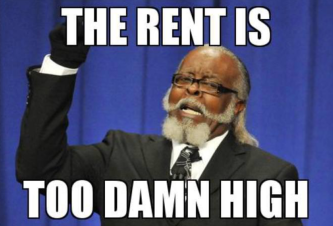
Empty storefronts are bad for neighborhoods – they contribute to blight, and they drag down the neighboring businesses. The premise of Prop D is that landlords are intentionally keeping these properties empty while they wait for a higher-paying tenant, to the detriment of all of the businesses around them. And if the city makes it more expensive to keep a storefront vacant, landlords will do more to get the spaces rented more quickly.
The Prop D tax would apply in areas like North Beach, Divisadero Street in NoPa, Taraval Street in the Sunset neighborhood and 24th Street in Noe Valley – all neighborhoods with vital business corridors, and which have been impacted by empty storefronts. According to the SF Office of Economic and Workforce Development, a neighborhood should maintain about 5-10% vacancy rate in retail units to remain healthy. The current citywide average is about 12 percent, and it is much much higher in some commercial corridors.
Greedy landlords are just one of the reasons for vacant storefronts, of course. Vacancies also result from permitting problems, recessions, fire and earthquake damage. Prop D accounts for some of these problems by including a generous grace period (it doesn’t take effect until 2021), and by making exceptions for fire and earthquake repairs. It also gives the Board of Supervisors the ability to amend or freeze it in a recession. It does NOT address other reasons for vacancy including the cost of construction, the city’s permitting processes, the city’s seismic retrofitting requirement, etc.
The elephant in the room is Amazon and other online retailers, which are putting the brick-and-mortar shops out of business. According to SPUR, private sector employment has grown by 32% in SF since 2001, while brick-and-mortar retail employment has declined by 12%. Just as the San Francisco economy is booming by most other measures, storefront retail is hurting, and it’s even less able to pay the rising rents in commercial corridors.
All that said, I am voting yes on Prop D because I think it will actually make it harder for landlords and commercial tenants to keep a storefront vacant. It may mean that commercial rents will also start to come down around the city, and that is a good thing for everyone (except for the commercial property owners). I also appreciate that the authors included the feedback of many stakeholders in the design process, including small business leaders, neighborhood districts and city agencies.
Prop D has the support of the entire Board of Supervisors, Mayor London Breed, and merchant associations. Commercial landlords oppose it, as does the San Francisco Republican party.
SF Proposition E – NO
 Prop E would limit the development of new office space by tying office development projects to whether the city is meeting its affordable housing goals. It is true that the city has enjoyed an incredible employment boom (thanks, Big Tech!); however, it has not been able to build housing fast enough to accommodate all the people who are taking those jobs. As a result, a lot of these folks need to live outside the city, and all those commuters are bad for traffic congestion, transit resources, the environment, etc.. The idea behind Prop E is that we need to bring jobs and housing into a better balance – and we do that by requiring that more affordable housing be built BEFORE we build ANY new office space.
Prop E would limit the development of new office space by tying office development projects to whether the city is meeting its affordable housing goals. It is true that the city has enjoyed an incredible employment boom (thanks, Big Tech!); however, it has not been able to build housing fast enough to accommodate all the people who are taking those jobs. As a result, a lot of these folks need to live outside the city, and all those commuters are bad for traffic congestion, transit resources, the environment, etc.. The idea behind Prop E is that we need to bring jobs and housing into a better balance – and we do that by requiring that more affordable housing be built BEFORE we build ANY new office space.
In my humble opinion, the answer to the imbalance isn’t SUBTRACTING office space and choking the city’s growth, it’s BUILDING MORE HOUSING. Prop E doesn’t fund or facilitate the building of housing. In fact, by stopping office developments, Prop E would actually rob the city of “impact fees” that developers pay that WOULD actually fund affordable housing. Doh!
The City’s own economist estimates that over the next 20 years, Prop. E would deprive San Francisco of more than 10 million square feet of office space, 47,000 jobs, $114 million in public programs and services, and 8.6 percentage points in economic growth, the equivalent of $23 billion. Office rents will continue to go up, which will hurt smaller, less profitable businesses. Limiting job growth will not make San Francisco more affordable. This is just bad policy.
Prop E is supported by the progressive members of the Board of Supervisors and the SF Tenants Union. Opposing the measure are SPUR, Mayor London Breed, and the moderate Supervisors, as well as SF Housing Action Coalition, YIMBY and State Senator Scott Wiener.
***
Thanks for reading! If you found this voter guide helpful, please donate here to help me cover my costs, and share this post on social media to spread the word. Writing voter guides is a labor of love for me, so I appreciate your support.




